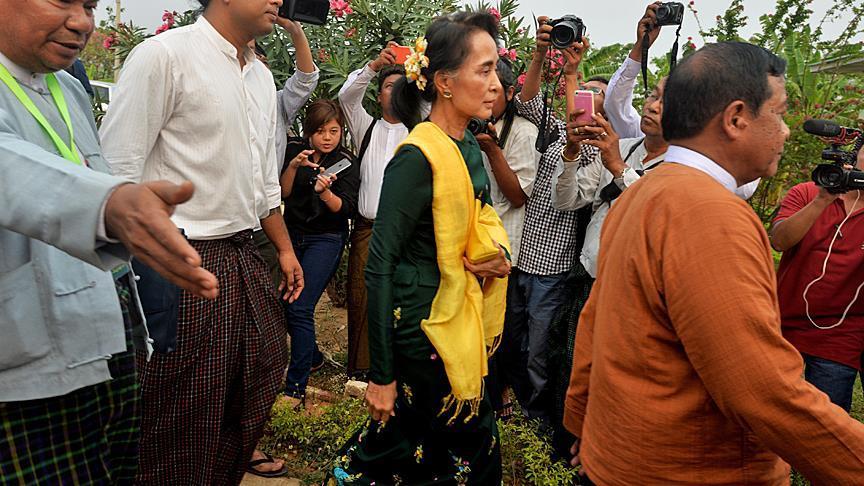Myanmar: Suu Kyi, UN human rights envoy discuss Rakhine
Foreign ministry says Suu Kyi explained reasons for avoiding using term ‘Rohingya’ for Muslim minority in troubled state
 Myanmar's State Counsellor and Foreign Minister Aung Suu Kyi (C)
Myanmar's State Counsellor and Foreign Minister Aung Suu Kyi (C)
By Kyaw Ye Lynn
YANGON, Myanmar
Myanmar State Counselor Aung San Suu Kyi and a United Nations human rights envoy, Yanghee Lee, have discussed how to address the situation in the country’s troubled Rakhine State, state media reported Tuesday.
During a meeting in political capital Nay Pyi Taw on Monday, Lee and Suu Kyi exchanged views on efforts to address the situation in the western state -- home to around one million Rohingya Muslims -- according to state-run newspaper the Global New Light of Myanmar.
Aung Lin, permanent secretary at the ministry of foreign affairs, told reporters after the meeting that “foreign minister [Suu Kyi] explained to her [Lee] why we should avoid using such controversial terms”.
He said the government of Myanmar would not use the terms "Rohingya and Bengali", but rather "Muslim community in Rakhine state".
Since mid-2012, communal violence between ethnic Buddhists and Muslims in Rakhine has left around 57 Muslims and 31 Buddhists dead, some 100,000 people displaced in camps and more than 2,500 houses burned -- most of which belonged to Rohingya.
Most in Myanmar see Rohingya -- described by the UN as the world's most persecuted ethnic minority group -- as illegal migrants from Bangladesh and refer to them as "Bengalis".
Since her party's victory in the Nov. 8, 2015 elections, Suu Kyi has been placed under tremendous international pressure to solve problems faced by Rohingya but has had to play a careful balancing act for fear of upsetting the country's nationalists, many of whom have accused Muslims of trying to eradicate the country's Buddhist traditions.
Suu Kyi has, however, enforced the notion that the root of many of the impoverished region's problems are economic, and is encouraging investment in the area, which in turn the National League for Democracy (NLD) hopes will lead to reconciliation between the Buddhist and Muslim communities.
On Monday, Suu Kyi and Lee also exchanged views on the ongoing peace process with armed ethic rebels, human rights laws, freedom of assembly and freedom of association, economic and social rights, providing humanitarian aid, and developments on joining remaining international core human rights treaties, according to official media.
Lee, the UN special rapporteur on human rights in Myanmar, arrived in Yangon on Sunday as part of her mission to compile a report to submit to the 71st UN General Assembly in September.
The 12-day trip will be her fourth visit to country and the first under the new government led by the NLD, which took power in late.
Lee will visit commercial capital Yangon, Nay Pyi Taw, Rakhine state’s capital Sittwe, Myitkyina in northern Kachin state and Lashio in eastern Shan state, said an announcement by the UN Information Center.
The UN’s national information officer Aye Win, however, has declined to comment on and provide the schedule of her Rakhine trip.
In her last visit to Myanmar in 2015, Lee’s access to Rakhine had been denied after the previous government was angered by her criticism of restrictions on political freedom and her demands for citizenship rights for Rohingya Muslims.
Anadolu Agency website contains only a portion of the news stories offered to subscribers in the AA News Broadcasting System (HAS), and in summarized form. Please contact us for subscription options.







